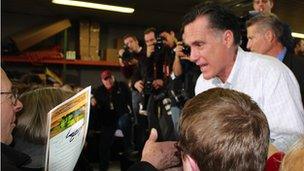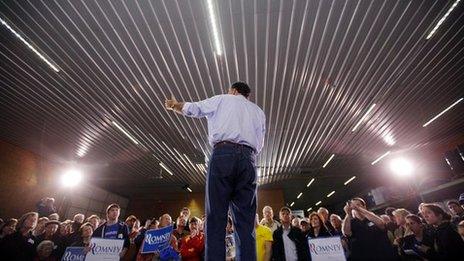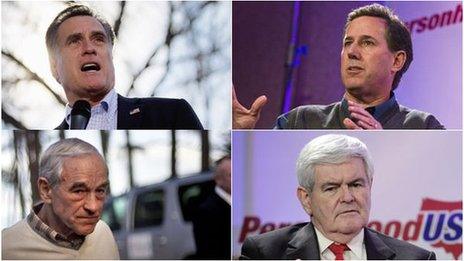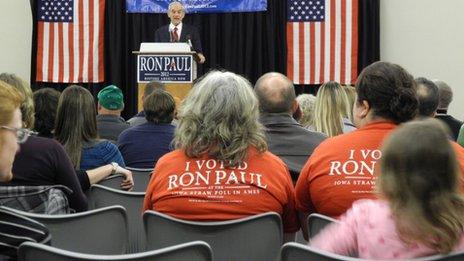Iowa Republican votes still up for grabs
- Published
- comments

If Mitt Romney wins the Iowa caucus, it would make him hard to beat
To the sound of Kid Rock, external's Born Free, a tanned and fit-looking Mitt Romney, dressed in blue jeans and crisp white shirt, bounds on stage. This is politics as stadium rock but the setting is more garage band. In fact, it is the first time I have been to a rally in a garage. Tyres hang on the wall, rusty chains coil around the place and a faint smell of oil permeates the air.
It is a testimony to the intimacy of the Iowa experience. Candidates have done nearly a thousand little events like this one, travelling 23,000 miles in the process.
And tonight it all comes to a head. The polls, external suggest a pretty tight contest for the top three places between Romney, Ron Paul and Rick Santorum. But Romney doesn't spend much time attacking his opponents.
There is coded stuff in the introductions, about the importance of family - aimed at the thrice-married Newt Gingrich - but nothing in his own speech. It is all aimed at the president. He calls Obama "the great divider, the great complainer".
Romney is behaving as though he already is the anointed Republican candidate and is fighting the presidential election. That's probably a good strategy. The Iowa result matters a lot to him, but he doesn't have to top the poll. Winning doesn't clinch the nomination but it would make him hard to beat.
Second place wouldn't worry him. If he and others have stopped Gingrich's rise, then he has probably dealt with his most serious rival. If he comes third, his team have more work to do, but it is reasonable to argue he could see off Paul and Santorum further down the road.
These bizarre primary contests are, on paper, about gathering votes for an election that will never happen. No-one expects delegates to have to vote at the Republican convention in Florida in August.
The Iowa caucus is even odder. Tonight's vote is not binding on delegates to that convention, so this isn't really any more than a glorified opinion poll. It matters because the media say it matters. Whoever gets the top spot in Iowa will get attention and interest and so momentum going into next week's election in New Hampshire.
It could be Ron Paul who makes it to the top. In a college further down the road in Cedar Rapids, the 76-year-old congressman, standing in front of a funky modernistic stainless steel statue, points out gleefully that there doesn't seem to be anyone over 40 at his rally. One middle-aged man gingerly raises his hand. But the Congressman is right.
In the crowd there's a scattering of tats, beanies and sculpted beards that you might think belong more on Occupy Wall Street than a Republican rally. One youthful group I talk to say they like Paul for his honesty. They say he tells uncomfortable truths and they think he can win voters from the left and the middle ground because of that.
His speech calls for troops to be pulled out not just from America's wars but South Korea, Japan and Germany. He attacks the Patriot Act as incompatible with freedom and civil liberties. He says the middle class have subsidised the privileged. With a bit of editing of the parts about the need to cut a trillion dollars spending in a year, you could mistake him for a left-wing Democrat.
Ron Paul would be an intriguing candidate in a general election. But he's a libertarian, not a conservative, and he would have to work hard to convince many Republicans he's the man they want.
The story of this contest so far has been the rise and fall of the candidates who could rival Mitt. First Bachmann, then Perry, then Cain and finally Newt. It was a puzzler why Rick Santorum, the earnest Christian conservative, seemed to make no impact, especially as he was working so hard in Iowa.
Now it seems his reward has come and his turn to surge, external has coincided with an actual vote. If he should top the poll, there is no reason why he should not build on that success although some say he has no organisation in other states, and not enough money either.
In a way, who does badly may be more important than who does well. A poor result for Bachmann, Perry or Newt may not kill them off straight away, but they may find cash and support begin to haemorrhage. You can find out what actually does happen as it happens here and on our live page.
- Published2 January 2012

- Published2 January 2012

- Published3 April 2012

- Published29 November 2011
